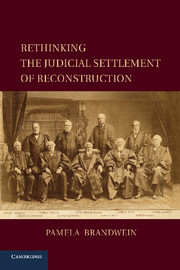Book contents
- Frontmatter
- Contents
- Acknowledgments
- 1 Abandoned Blacks?
- 2 The Emergence of the Concept of State Neglect, 1867–1873
- 3 The Civil/Social Distinction
- 4 The Birth of State Action Doctrine, 1874–1876
- 5 A Surviving Sectional Context, 1876–1891
- 6 The Civil Rights Cases and the Language of State Neglect
- 7 Definitive Judicial Abandonment, 1896–1906
- 8 Twentieth-Century Receptions
- 9 Conclusion
- Bibliography
- Index
5 - A Surviving Sectional Context, 1876–1891
Published online by Cambridge University Press: 03 May 2011
- Frontmatter
- Contents
- Acknowledgments
- 1 Abandoned Blacks?
- 2 The Emergence of the Concept of State Neglect, 1867–1873
- 3 The Civil/Social Distinction
- 4 The Birth of State Action Doctrine, 1874–1876
- 5 A Surviving Sectional Context, 1876–1891
- 6 The Civil Rights Cases and the Language of State Neglect
- 7 Definitive Judicial Abandonment, 1896–1906
- 8 Twentieth-Century Receptions
- 9 Conclusion
- Bibliography
- Index
Summary
A half-century ago, the classic work of C. Vann Woodward established a view of the Compromise of 1877 as a demarcation line – a falling curtain – marking the death of Reconstruction. Contemporaneous indicators appeared to confirm Woodward's view. In a well-known proclamation, The Nation declared: “The Negro will disappear from the field of national politics. Henceforth the nation, as a nation, will have nothing more to do with him.” A line between the election of 1876 and its aftermath, however, cannot be so sharply drawn. “If the Republican Party had deserted blacks in 1877,” stated Stanley Hirshson, “that abandonment was short-lived. By 1878, sectionalism was once again the official policy of a Republican administration. For fifteen years after that, the race problem played a key role in party affairs.” Charles Calhoun explains that the Southern question remained “central… to the party's sense of itself and its mission, even in the years after 1877” and Republican administrations “still embraced the threat of intervention.” Indeed, federal voting rights enforcement rebounded in the 1880s.
The Cruikshank and Reese decisions took place in a political context marked by enduring North-South sectional antipathies and a surviving Republican investment in black civil and political inclusion. A period of political transition and fluctuation had already set in; the Panic of 1873 and election of 1874 had altered the politics of rights enforcement. But even while the Reconstruction coalition was weakened, it was not powerless or defeated.
- Type
- Chapter
- Information
- Rethinking the Judicial Settlement of Reconstruction , pp. 129 - 160Publisher: Cambridge University PressPrint publication year: 2011

